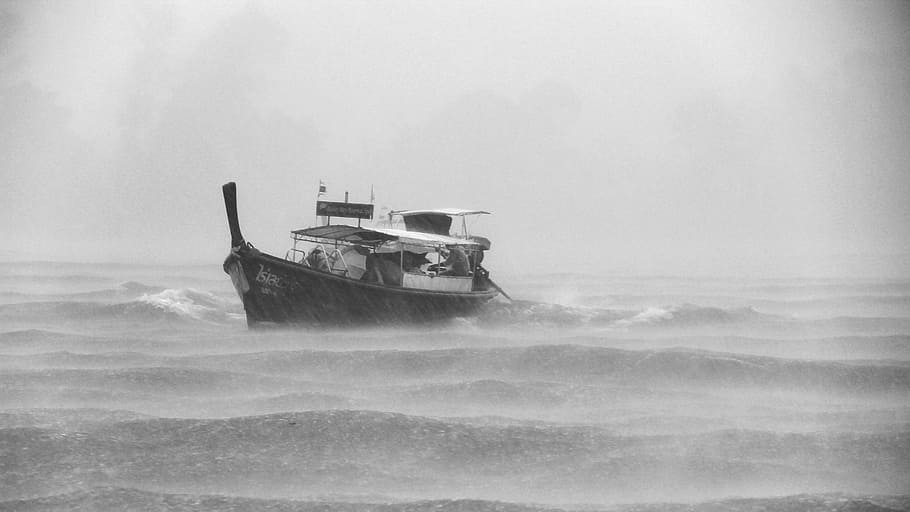In a recent interview I conducted with a successful entrepreneur, he talked about viewing a business like it were a ship. The analogy works particularly well as the concept of a business was originally born out of the idea of a ship’s company. It goes along the same lines of the Jim Collins book, Good to Great, where he uses the analogy of a bus. Essentially everyone in your company, like on your ship or bus, needs to want to go in the same direction. That journey might not be easy sailing, but you know where you are heading and want to get to the destination together.
Each member of the team knows their role in getting the ship to its destination and there is an appreciation of everyone having to work together to achieve the same goal. The bridge of the ship provides direction as to where the ship is heading, to warn when bad weather is approaching and help baton down the hatches. The bridge of a ship does not have many people on it, so you cannot direct it by consensus and ultimately one person is responsible for the overall safety of the boat.
I feel this analogy works particularly well when we think about our government and the pandemic that we have been fighting during 2020. While every country is bobbing about in the sea with multiple storms on the horizon – we look to our government, at the helm, to navigate the ship safely to port. The problem is we do not know which port we should be heading for.
As we struggle with the inevitable second wave, which was spoken about a lot back in March and seems to have arrived by surprise, we are without a clear destination on where we are trying to get the country to. The reality is that we are going to be at sea for a while and to keep all the shipmates working in harmony there needs to be a clear direction on what measures we should take to ride out each storm and what the final destination is we are looking for.
I appreciate you are reading this and saying this is easier said than done, but honestly a year since the virus hit our shores we have a clear idea on how it spreads, getting better at treatment as the second wave shows and remember that science predictions and models are just that, predictions. In the same way that scientists provide weather forecasts, whilst overall they are accurate, they are not perfect and are being continually refined. We should not blindly follow the science and instead need to tack a course through the storm. As a sea faring nation, we should be pretty good at it.
For me that destination first starts with clear plans and procedures on how to weather each storm, i.e. an outbreak. We know that lockdowns are not a long-term solution. Whilst they lower the levels of infection in the short term but as soon as they are lifted the infection rate climbs as we rush back to socialising and everyday life. Whether you agree or not with Sweden’s response, they have not suffered from the spikes that have repeatedly put undue pressure on both the government and health services. Likewise with the average age of deaths being over 82 the measures we take as a society need to be reflective of this particular age demographic.
In the same way that when a ship hits a storm it doesn’t just turn off the engine and get tossed about in the waves – this is a very quick way to never reaching your destination and suffering more potential damage. Instead we need to look at all the tools available at our disposal to help minimise spreading and making it an everyday part of life. Only through setting out clear processes that do not change and are uniform will we make an impact on lowering the spread and minimising the impact to our economy, social welfare and day to day activities.
We need to be completely consistent now, and in the future, in how each outbreak will be dealt with. That would provide many with the confidence they need to make plans for their own day to day activities. Granted one size doesn’t fit all but we need to be clear on what the response will be and how it will be implemented. This is a crucial part to getting our economy moving again as people need a clear plan that they can put their own plans against. As we approach a dark, wet winter people need something to look forward to. Holidays, travel, seeing friends are all part of this and taking away the ability for people to plan takes away their future.
Which brings me to the destination. We need a future without fear so people can move freely, plan their lives and be confident that those plans will materialise. Trust in the government needs to be reinstated as it has been lost over the past months due to their indecisiveness and their propensity to change their advice and the rules. This seems to have not been driven just by scientific evidence but also due to the national populous consensus on Covid19, driven by fear spread in the media. As Jim Collins recounts in my favourite book ‘From Good to Great’ there is a concept he talks about called the Stockdale Paradox. Essentially James Stockdale was a Vietnam prisoner of war and his observation that you have to get to grips with the brutal reality of your situation while remaining positive. He said the optimistic prisoners died because they always thought they were going to get out tomorrow and hence couldn’t deal with months and years of ongoing torture and squalor. Those who hoped for the best but acknowledged and prepared for the worst made it through. So we need a balance of positive leadership (as nobody wants to follow a pessimist) who understands and articulates the challenges that lay before us.
National restrictions and lockdowns are at the fringes of what is possible, and we need to decide where in the middle the UK sits and then stick to it. Give people stability so they can plan their lives, removing the uncertainty. We are all in the same ship and all need to unite in our common goal of navigating the sea to reach port.





Leave a Reply